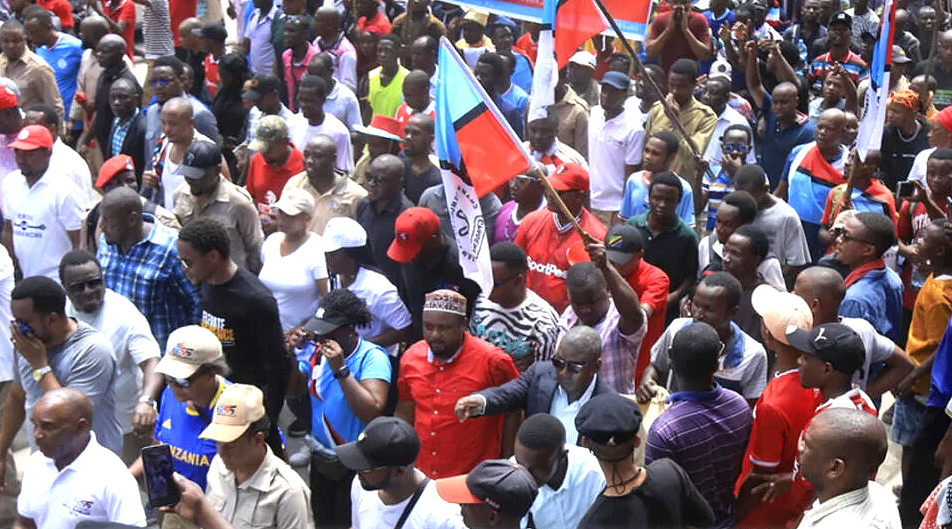Hundreds of anti-government demonstrators have been killed by the police and the army after days of protests over Tanzania’s disputed election, which incumbent President Samia Suluhu Hassan was declared to have won with nearly 87 per cent of the vote.
Police fired gunshots and tear gas as demonstrators took to the streets in the capital Dar Es Salaam during Wednesday’s vote, with some tearing down banners and setting fire to government buildings.
Protesters are angry about the exclusion of her two biggest challengers from the contest and say that there is widespread repression.
Tanzania’s main opposition party claims hundreds were killed in the protests, while the UN said credible reports indicated at least 10 people had been killed in three cities.
The electoral commission said Hassan received more than 31.9 million votes, with turnout nearing 87% of the East African nation’s registered voters.
However, many witnesses said turnout on election day appeared low, with some polling stations disrupted by protests.
The main opposition party CHADEMA called for demonstrations during the election, which it said amounted to a ‘coronation’ of Hassan.
The party was disqualified in April after refusing to sign a controversial code of conduct and its leader Tundu Lissu has been jailed for months after being charged with treason.
Lissu had called for electoral reforms, which he said were needed for free and fair elections.
Tanzanian authorities have not said how many people have been killed or injured in the violence.
The Tanzanian government claimed that the opposition’s death toll was ‘hugely exaggerated’ and has rejected criticism of its human rights record.
Hassan won praise after she took office in 2021 following the death of her predecessor.
She was credited with easing repression but has been criticised more recently by opposition parties and activists after a string of arrests and alleged abductions of opponents.
She has denied allegations of widespread rights abuses. Last year, she said she had ordered an investigation into reports of abductions, but no official findings have been released.
Only minor parties were permitted to take on Hassan in the elections after CHADEMA and fellow opposition party ACT-Wazalendo had their candidates disqualified.
Meanwhile, in South Africa, the airline FlySafair is facing potential flight disruptions as its cabin crew threatens to strike following the collapse of wage negotiations with management.
The dispute, led by the South African Cabin Crew Association (SACCA), centres on salary increases, working conditions, and flight duty schedules.
Union representatives say flight attendants have grown increasingly frustrated over ‘stagnant pay amid rising living costs’ and ‘mounting workload pressures.’
SACCA spokesperson Nomsa Dlamini said members have remained patient through challenging times but now demand meaningful change.
Dlamini said: ‘Our members have shown remarkable dedication and professionalism, even during tough times.
‘But fair compensation and respect for work-life balance are non-negotiable. FlySafair must come to the table with a serious offer.’
FlySafair confirmed that discussions with employee representatives are ongoing, but tried to calm fears of an imminent shutdown.
The strike threat comes just weeks before the festive travel rush, a peak period for domestic air travel, and a walkout will disrupt thousands of passengers on key routes, including Johannesburg, Cape Town, Durban, and Gqeberha.
Elsewhere in Lesotho, hundreds of textile workers marched in the capital Maseru on Friday in protest against massive job losses caused by United States-imposed tariffs on exports.
The administration of US President Donald Trump slapped the small southern African nation with 50 percent tariffs – in April, before lowering the levy to 15 percent in July.
Its textile sector – the largest employer in the country of around 2.3 million people – was particularly hit as it had benefitted heavily from duty-free access to US markets under the African Growth and Opportunity Act (AGOA) – which expired at the end of September.
Hundreds of people marched into Maseru’s centre, carrying flags and chanting in a demonstration called by six trade unions.
The National Clothing Textile and Allied Workers Union general secretary Sam Mokhele said: ‘Government must also negotiate with the US government for the immediate renewal of AGOA.’
AGOA, a cornerstone of US-Africa trade relations for 25 years, gave certain African countries preferential access to the US market by eliminating duties on cars, clothes and other items worth billions of dollars.
In July, the Lesotho government declared a ‘state of emergency over soaring unemployment, with the rate at 38 per cent among young people.
It had previously warned that up to 40,000 jobs were at risk if AGOA was not renewed.
Textile worker Mamakalo Mohapi said: ‘Factories are closing because of the US-imposed tariffs, and without AGOA, things are getting worse. I don’t want to lose my job.’
